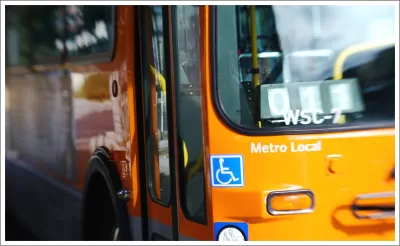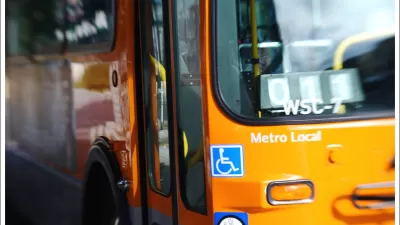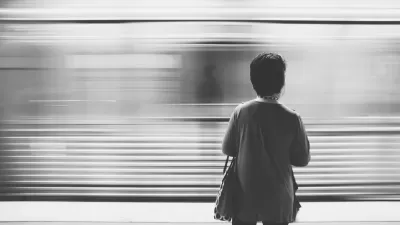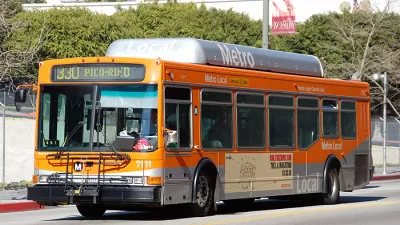A reporter rides the bus in Los Angeles and discovers the interesting, complicated, and sometimes heartbreaking stories that riders bring on board.

Frank Shyong writes about his experience riding on the Line 2 local bus that runs between downtown Los Angeles and Westwood near the UCLA campus. "The route connects some of L.A.’s richest ZIP codes to some of its poorest, the eastbound route starting in Westwood and taking Sunset Boulevard all the way downtown, where it terminates in front of a Jack in the Box on a block that always smells like urine."
Most Metro bus riders are people of color, particularly Latino, and poor or lower income, and many are dependent on the bus as their sole means of transportation, says Shyong. He describes the bus as a complex and diverse world:
What I most appreciated about the bus, and what I think a lot of us love about the idea of public transit, is the people. Because a city is its people, and in L.A., people are from everywhere and go through everything. Poverty, mental illness, struggle, exhaustion and kaleidoscopic diversity — the bus makes you look all of that in the face.
Shyong shares snippets of the lives of the various people he meets during his week of riding the bus. One rider is a woman named Adela who is headed to the Westside to clean houses, as a number of women on this route do. "During the two-hour ride, she often stares out the window and thinks about her family back in Chiapas, Mexico. Her mother is getting older, and Adela wants to be with her. Maybe next year, after she saves up enough money. Maybe in two years. One house at a time."
FULL STORY: The No. 2 Metro bus connects the fantasies and realities of Los Angeles

Maui's Vacation Rental Debate Turns Ugly
Verbal attacks, misinformation campaigns and fistfights plague a high-stakes debate to convert thousands of vacation rentals into long-term housing.

Planetizen Federal Action Tracker
A weekly monitor of how Trump’s orders and actions are impacting planners and planning in America.

In Urban Planning, AI Prompting Could be the New Design Thinking
Creativity has long been key to great urban design. What if we see AI as our new creative partner?

King County Supportive Housing Program Offers Hope for Unhoused Residents
The county is taking a ‘Housing First’ approach that prioritizes getting people into housing, then offering wraparound supportive services.

Researchers Use AI to Get Clearer Picture of US Housing
Analysts are using artificial intelligence to supercharge their research by allowing them to comb through data faster. Though these AI tools can be error prone, they save time and housing researchers are optimistic about the future.

Making Shared Micromobility More Inclusive
Cities and shared mobility system operators can do more to include people with disabilities in planning and operations, per a new report.
Urban Design for Planners 1: Software Tools
This six-course series explores essential urban design concepts using open source software and equips planners with the tools they need to participate fully in the urban design process.
Planning for Universal Design
Learn the tools for implementing Universal Design in planning regulations.
planning NEXT
Appalachian Highlands Housing Partners
Mpact (founded as Rail~Volution)
City of Camden Redevelopment Agency
City of Astoria
City of Portland
City of Laramie





























